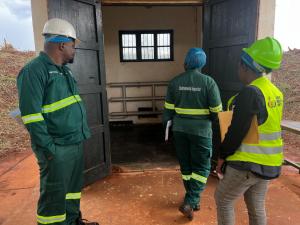Uganda steps up: Pioneering mercury-free healthcare for a safer future
At a bustling outpatient clinic on the outskirts of Kampala, a nurse reaches for a thermometer—slim, silvery, and fragile. It’s a mercury-containing device, once a staple in healthcare, now recognized as a silent hazard. Uganda is taking bold steps to eliminate such risks and transition toward mercury-free healthcare.
In healthcare settings, mercury-containing devices—especially thermometers and blood pressure measuring devices (sphygmomanometers)—have long been used to diagnose illness and monitor treatment. But mercury, a potent neurotoxin, remains a contributing factor to Uganda’s burden of disease. Its toxic effects on the nervous, immune, and digestive systems—as well as the lungs, kidneys, and skin—have prompted global action.
According to Dr. Herbert Nabaasa, Commissioner of Environmental Health at the Ministry of Health, “promoting the use of safe and mercury-free alternatives, coupled with appropriate disposal of mercury-containing devices, offers a sustainable solution to this public health threat.”
Uganda, according to its National Minamata Initial Assessment Report, between 2013 and 2015 imported an average of 25,642 such devices annually, including an estimated 2,564 manometer blood pressure devices. As of 2018, mercury pollution from healthcare sources in Uganda totaled 442 kg per year (205 kg from manometers and gauges, 70 kg from incinerated medical waste, 146 kg from dental amalgam, and 21 kg from thermometers).
The 2013 Minamata Convention on Mercury, to which Uganda is a party, and entered into force on 16 August 2017, calls for the phase-out of mercury-containing medical devices and the adoption of safer alternatives. “Studies have shown that digital thermometers can be up to one-third cheaper than their mercury counterparts when considering the full lifecycle, without compromising clinical accuracy,” says Dr. Suraj Man Shrestha, WHO Programme Management Officer.
A survey conducted by National Environment Management Authority (NEMA) in 2021 in 38 facilities across Uganda suggested that only 25.7% of these facilities discarded mercury containing thermometers and sphygmomanometers to authorized waste management operators for disposal.
Uganda is one of five countries globally implementing the five-year Global Environment Facility (GEF) project aimed at phasing out mercury supported by United Nations Environment Programme (UNEP) with technical guidance from World Health Organization (WHO). Ministry of Health, Ministry of Water and Environment, alongside NEMA, are the leading government entities for the project.
The initiative supports development of national strategies to phase out the manufacture, import, and export of mercury thermometers and sphygmomanometers, in line with WHO recommendations and the Minamata Convention on Mercury, adopted in 2013.
Under the project, Mbarara Regional Referral Hospital (RRH) in southwestern Uganda and St. Francis Hospital, Nsambya in Kampala are to benefit from the substitution of mercury medical devices with mercury-free ones.
An inventory conducted at Mbarara RRH reported having one mercury thermometer and one sphygmomanometer still in use. “We welcome the project and will support it fully. Most of our units are already using mercury-free vital signs monitors,” explains Dr Deus Twesigye, Acting Director of Mbarara RRH.
At St. Francis Hospital, Nsambya, the facility reported having six mercury thermometers and fifty mercury sphygmomanometers still in use. “We look forward to equally reliable substitutes,” says Sr. Dr Assumpta Nabawanuka the hospital director for clinical services.
The two health facilities still need support in disposal of medical waste where mercury containing waste is not sorted from the rest of the medical waste.
A delegation from WHO, the Ministry of Health, and NEMA further visited Luwero Industries Limited (LIL) in Nakasongola district. The delegation assessed the facility’s potential to serve as a safe, environmentally sound interim storage site for mercury-containing medical waste. LIL owns and operates two modern incinerators, an engineered landfill and earth moving equipment to handle and manage hazardous and non-hazardous waste, including medical and pharmaceutical waste.
“I confirm that we have the capacity to store mercury devices and manage related waste in an environmentally friendly way given that we have done it before,” says Engineer Gerald Lumu Deputy General manager Luwero Industries Limited.
To support the transition, NEMA has updated the National Environment Act (Cap 181) and related regulations to prohibit the use and recycling of non-electronic mercury measuring devices after the 2020 phase-out date. These updates also address the management of mercury-contaminated sites and waste.
“Once Luwero Industries Limited gets the required license from NEMA to store mercury and consider secondary containment for the mercury devices, it is an ideal facility for the interim storage for these mercury containing devices,” says Anne Nakafero, the Principal biodiversity officer at NEMA.
Uganda’s commitment to mercury-free healthcare is more than a policy shift—it’s a bold declaration of its dedication to safeguarding public health and the environment. By aligning with global conventions, investing in safer technologies, and empowering institutions like Luwero Industries Limited to manage hazardous waste responsibly, the country is setting a powerful precedent for the Africa Region. This transformation is not just about replacing devices; it’s about reimagining healthcare systems that prioritize safety, sustainability, and innovation. With continued collaboration among government agencies, healthcare providers, and international partners, Uganda is not only protecting its people today but also laying the foundation for a healthier, toxin-free tomorrow.

